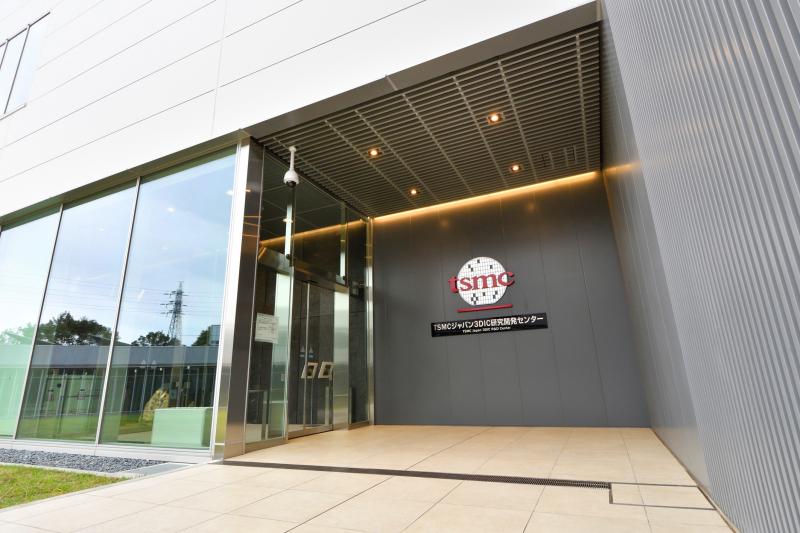Taiwan Semiconductor Manufacturing Co (TSMC, 台積電) yesterday said its subsidiary TSMC Japan 3DIC R&D Center has completed construction of its clean room in the Tsukuba Center of the National Institute of Advanced Industrial Science and Technology.
The center was established in Japan’s Ibaraki Prefecture in March last year to pursue research into the next generations of 3D silicon stacking and advanced packaging technologies in materials science, the chipmaker said in a statement.
The Japanese government is to provide an unspecified subsidy for the center.

Photo courtesy of Taiwan Semiconductor Manufacturing Co
The new technologies would enable system-level innovations to enhance computing performance and integrate more functionality, opening a new path for driving semiconductor technology forward in addition to the industry’s conventional path of shrinking transistor size, TSMC said.
With the completion of the clean room, the TSMC Japan 3DIC R&D Center is to support research and development of state-of-the-art 3D IC packaging material in collaboration with its Japanese partners, domestic research institutes and universities possessing strengths in semiconductor materials and equipment, the statement said.
“Beginning with our foundry business model, TSMC has always believed that by focusing on what we do best, each of us in the semiconductor field can maximize our contribution to pushing technology forward,” TSMC chief executive C.C. Wei (魏哲家) said in the statement.
“The Japan 3DIC R&D Center is a perfect example of this collaboration in action. By bringing TSMC together with Japanese talent, we will empower each other to make breakthroughs together,” he said.
“We are witnessing an increase in structural demand driven by the megatrends of 5G and high-performance computing-related applications, and further technology innovation will be needed to meet this demand,” TSMC Japan 3DIC R&D Center vice president and general manager Yutaka Emoto said in the statement.
“Japan has many companies with functional materials and key technologies that are important in the global semiconductor supply chain, and TSMC will continue to work on semiconductor process innovation through joint research and development with them,” he said.
“At the same time, we can serve as a bridge between our partners at the 3DIC R&D Center and the world-class semiconductor companies among TSMC’s customers,” he said.

POWERING UP: PSUs for AI servers made up about 50% of Delta’s total server PSU revenue during the first three quarters of last year, the company said Power supply and electronic components maker Delta Electronics Inc (台達電) reported record-high revenue of NT$161.61 billion (US$5.11 billion) for last quarter and said it remains positive about this quarter. Last quarter’s figure was up 7.6 percent from the previous quarter and 41.51 percent higher than a year earlier, and largely in line with Yuanta Securities Investment Consulting Co’s (元大投顧) forecast of NT$160 billion. Delta’s annual revenue last year rose 31.76 percent year-on-year to NT$554.89 billion, also a record high for the company. Its strong performance reflected continued demand for high-performance power solutions and advanced liquid-cooling products used in artificial intelligence (AI) data centers,

SIZE MATTERS: TSMC started phasing out 8-inch wafer production last year, while Samsung is more aggressively retiring 8-inch capacity, TrendForce said Chipmakers are expected to raise prices of 8-inch wafers by up to 20 percent this year on concern over supply constraints as major contract chipmakers Taiwan Semiconductor Manufacturing Co (TSMC, 台積電) and Samsung Electronics Co gradually retire less advanced wafer capacity, TrendForce Corp (集邦科技) said yesterday. It is the first significant across-the-board price hike since a global semiconductor correction in 2023, the Taipei-based market researcher said in a report. Global 8-inch wafer capacity slid 0.3 percent year-on-year last year, although 8-inch wafer prices still hovered at relatively stable levels throughout the year, TrendForce said. The downward trend is expected to continue this year,

Vincent Wei led fellow Singaporean farmers around an empty Malaysian plot, laying out plans for a greenhouse and rows of leafy vegetables. What he pitched was not just space for crops, but a lifeline for growers struggling to make ends meet in a city-state with high prices and little vacant land. The future agriculture hub is part of a joint special economic zone launched last year by the two neighbors, expected to cost US$123 million and produce 10,000 tonnes of fresh produce annually. It is attracting Singaporean farmers with promises of cheaper land, labor and energy just over the border.

US actor Matthew McConaughey has filed recordings of his image and voice with US patent authorities to protect them from unauthorized usage by artificial intelligence (AI) platforms, a representative said earlier this week. Several video clips and audio recordings were registered by the commercial arm of the Just Keep Livin’ Foundation, a non-profit created by the Oscar-winning actor and his wife, Camila, according to the US Patent and Trademark Office database. Many artists are increasingly concerned about the uncontrolled use of their image via generative AI since the rollout of ChatGPT and other AI-powered tools. Several US states have adopted